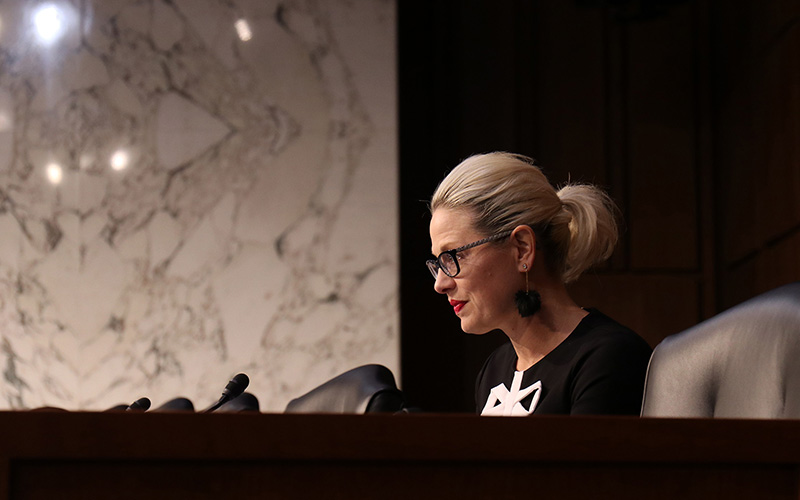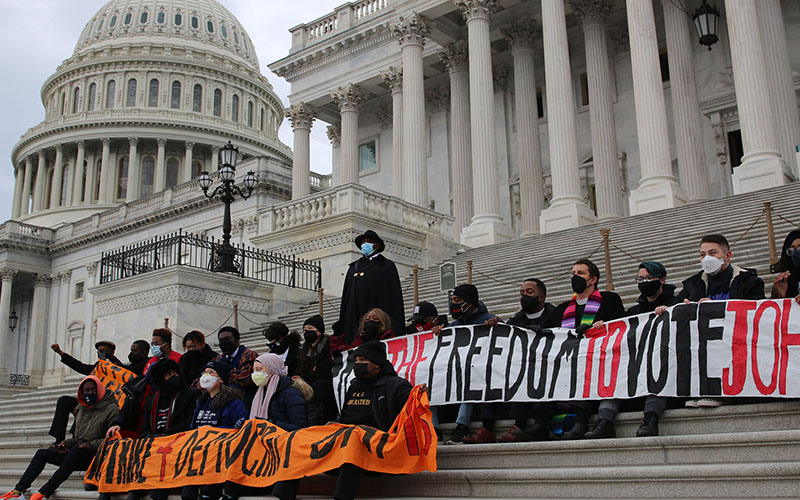WASHINGTON – Former President Ronald Reagan’s 11th commandment – “thou shalt not speak ill of a fellow Republican” – is being broken more and more these days, by Republicans and Democrats alike.
The most recent example was the Arizona Democratic Party’s censure last week of Sen. Kyrsten Sinema, D-Arizona, after she refused to vote against a filibuster, likely dooming election reform legislation in the Senate.
The Democrats’ action came a year after Arizona Republicans censured Gov. Doug Ducey, former Sen. Jeff Flake and Cindy McCain for the perceived – or actual – opposition to former President Donald Trump. The party also censured McCain’s husband in 2014, the late GOP Sen. John McCain, for a voting record party members considered too liberal.
“It’s almost like if you’re a prominent politician in Arizona, being censured is almost like a rite of passage to a certain extent,” said J. Miles Coleman, an analyst with Sabato’s Crystal Ball at the University of Virginia Center for Politics.
Arizona is not the only state where political parties are taking their elected officials to task, a change that analysts and former lawmakers attribute to the politically polarized times.
“We’ve become so much more polarized today than we were two or three decades ago,” said Jim Kolbe, a Republican who represented the Tucson area in the U.S. House from 1985 to 2007. “It’s been gradually changing, but it’s really heightened in the last years.”
Arizona Democratic Party Chair Raquel Terán said “we take no pleasure” in the party executive board’s decision last Saturday to formally censure Sinema for votes last week that allowed Senate Republicans to continue to block action on voting rights legislation.
Under a filibuster, senators can keep talking on a bill unless there are 60 votes to end debate – something that’s all but impossible in a Senate divided 50-50. When Democratic leaders tried to change the filibuster rule last week with a simple majority vote, Sinema was one of two Democrats – with West Virginia Sen. Joe Manchin – who voted with the GOP, allowing the filibuster to continue.
That was the last straw for Arizona Democrats, who warned Sinema in September that the party would “closely watch” her votes on the filibuster after she said last summer that she would not vote to do away with it.
“The Arizona Democratic Party is a diverse coalition with plenty of room for policy disagreements, however on the matter of the filibuster and the urgency to protect voting rights, we have been crystal clear,” Terán said in her Saturday statement. “In the choice between an archaic legislative norm and protecting Arizonans’ right to vote, we choose the latter, and we always will.”
When asked for a response, Sinema spokesperson Hannah Hurley said that during her tenure in both the House and Senate, Sinema “has always promised Arizonans she would be an independent voice for the state – not for either political party.”
Hurley stressed that Sinema supports the voting rights bills, pointing to a floor speech earlier this month in which Sinema said election reform is badly needed to blunt voting restrictions being passed in many states. But Sinema said in that same speech that she would not vote to do away with the filibuster, which she said is needed to protect the minority party.
Sinema is not the only member of Congress to face her party’s wrath recently. After they voted to impeach former President Donald Trump, Republican Reps. Liz Cheney of Wyoming and Adam Kinzinger of Illinois, along with GOP Sens. Lisa Murkowski of Alaska, Bill Cassidy of Louisiana and Richard Burr of North Carolina were all censured by their state parties.
It was their perceived lack of support for – or opposition to – Trump that landed Ducey, Flake and McCain in hot water with the Arizona Republican Party last year.
Ducey defended Arizona’s handling of the 2020 election and certified Democratic President Joe Biden’s win in the state, while Flake and McCain actively supported Biden’s candidacy over Trump.
A spokeswoman for Ducey downplayed the censure at the time, saying in news reports that the actions “are of no consequence whatsoever.”
Flake and McCain, longtime antagonists of Trump, laughed the censure off: Flake tweeted a photo of the three of them at Biden’s inauguration with the caption, “Good company.” McCain called it a “badge of honor” to be censured in the company of those who “have served our state and our nation so well … and who, like my late husband John, have been censured by the AZGOP.”
Jason Rose, an Arizona political consultant, said it is never good to be censured by your party, but it is probably not all that damaging to the target of the censure.
“Don’t forget, the people that are doing this are a very, very, very small slice of each party. They’re not necessarily representative of the party as a whole,” Rose said.
It can be the price of being a maverick, a label John McCain adopted and Sinema embraces. It’s not a bad thing in Arizona, Rose said.
“You’re going to have these independents, and political parties like people to toe the party line, they don’t like independents,” he said.
Good company pic.twitter.com/1pdgVGE5Ps
— Jeff Flake (@JeffFlake) January 24, 2021
Coleman said the censure could be trouble for Sinema, whose “career is looking more tenuous than it ever has been.”
A November poll by OH Predictive Insights found that 47% of Arizona Democrats had a unfavorable opinion of Sinema, as did 45% of Republicans. Those numbers were no better when the same question was asked this month, before the filibuster vote: 48% of state Democrats had an unfavorable opinion of Sinema, compared to 45% of Republican voters.
But Coleman also notes that Sinema has time to recover, as she does not face re-election until 2024.
Coleman said the move to censure party leaders is happening in other states and in both parties. But he thinks it has “been more of … a Republican thing,” and that Arizona stands out.
“We’ve seen it across the country, but in Arizona, it definitely feels like you hear the most about it than any other state,” Coleman said.
Kolbe said the rush to censure is a definite change from when he was in Congress.
“There’s no question that this idea of censuring officeholders is something that’s taken hold in both parties,” he said.
For Rose, looking back to Reagan’s commandment, it’s not a change for the better. He said politics went from Reagan’s “don’t speak ill of another Republican” to Trump “whose 11th commandment seems to be to speak ill of fellow Republicans to keep them in line.”
“What a difference four decades makes,” Rose said.


